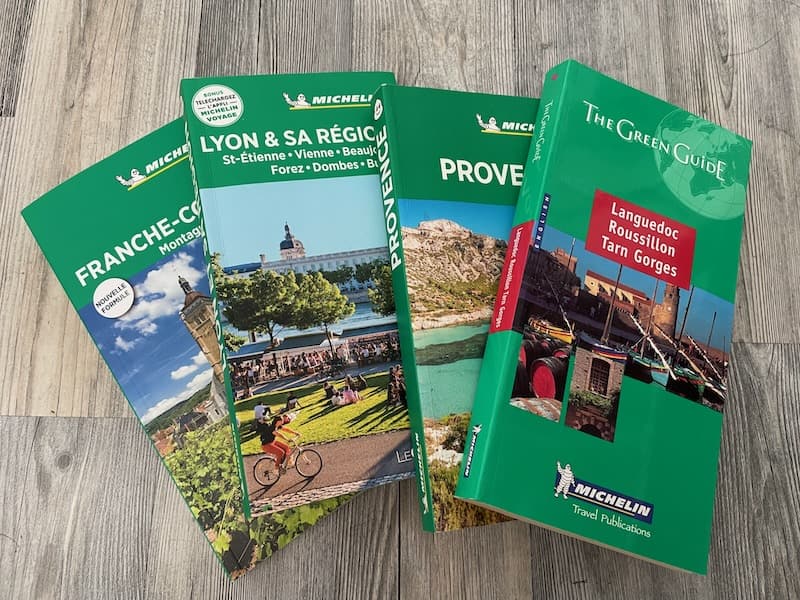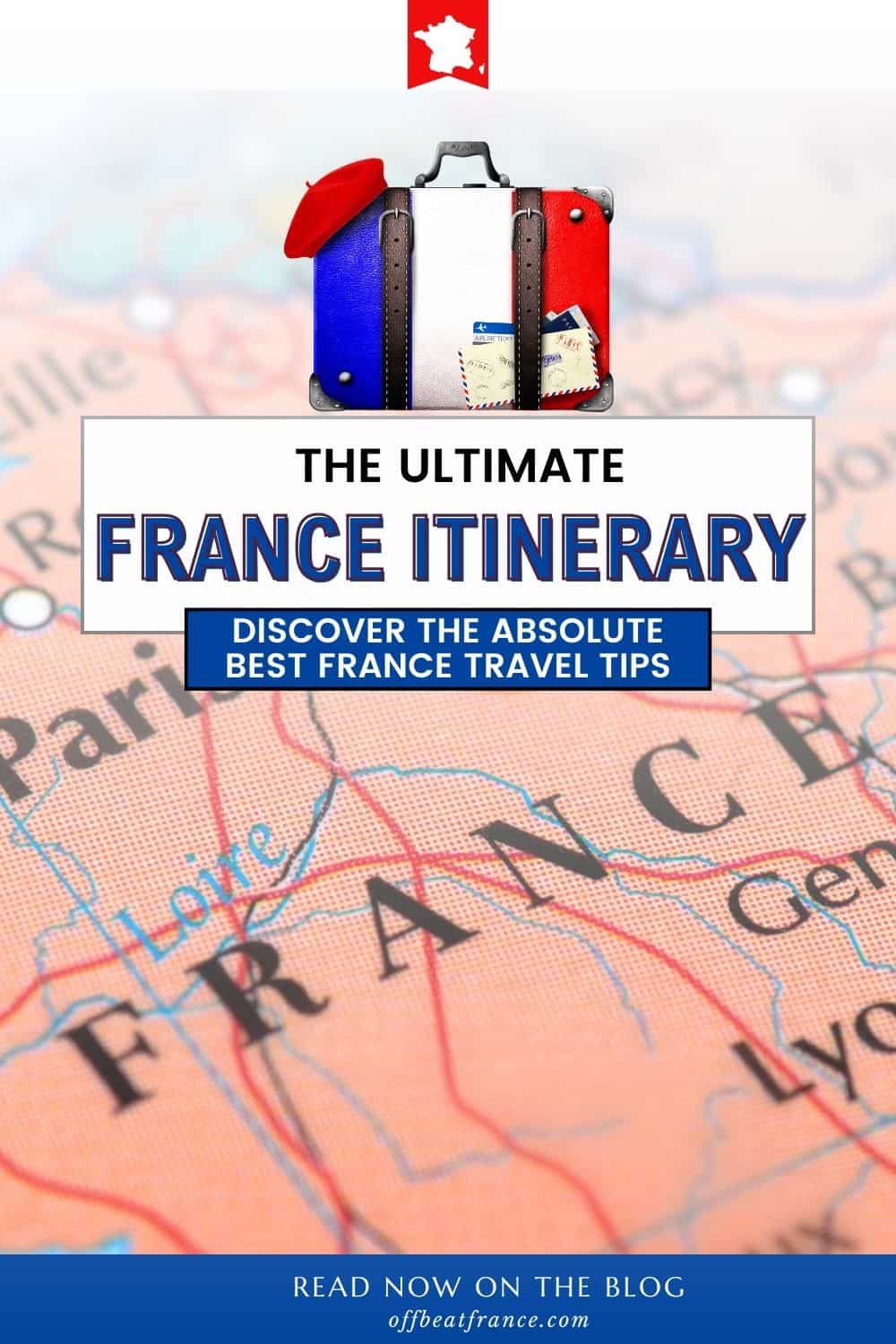Unsure about your French table manners? Click Here to download > > How to avoid these 10 food etiquette mistakes !
- Home ›
- Destinations ›
- Plan Your French Itinerary
Planning the ultimate France Itinerary:
A Step-by-Step Guide
Published 15 July 2022 by Leyla Alyanak — Parisian by birth, Lyonnaise by adoption, historian by passion
Do you struggle planning your France itinerary? It's easy enough to find something off the peg online, but the best way to ensure it's the way you like it is to... plan your own, as I do.
Planning your France itinerary can be as easy as copying one I've designed or searching for one on the web.
But if you're like me, the cookie-cutter approach may not work, and you may want something special, or different, or offbeat.
That means... you'll have to plan your own itinerary. With all the places you want to see.
NOTE: Pages on this site may contain affiliate links, which support this site. See full Privacy Policy here.
How to plan your own France itinerary
You can do this! But you'll have to be organized, because the bane of travel planning is simply this: too much information.
It's easy to get overwhelmed online, especially when it comes to a country as diverse as France. Start reading, and you'll want to go everywhere, see everything, even if you only have a few days for your French trip.
Planning things properly will guarantee you don't miss out on your most cherished sights.
1. Get your paperwork out of the way
This is basic to any trip, but I'll remind you anyway: you'll need all your paperwork, including tickets, passport, visas, health insurance, vaccination papers, reservation notifications, credit cards and cash.
In other words, the basics.
TRAVEL TIP : Make sure you photograph all your paperwork and save everything on a flash drive (these are the ones I use). If you lose your papers, you'll be able to replace things more easily; you'll also need all this information to file a police report.
2. Choose your travel dates
This should be done first because the dates will probably dictate where you go.
Most of the year is fine somewhere in the country, but there are a few periods to avoid: July and August, for example, can be unpleasant in large cities, and school holiday times (the English version of the site doesn't seem to be working) can mean expensive accommodation and crowded attractions.
Here are the best times to visit France, by season and by region.
TRAVEL TIP : Try to time your trip to coincide with a festival or celebration. France does these beautifully and you'll find some sort of celebration pretty much any time of year, across the country. (Here's the French government's impossibly sophisticated festivals database.)
3. How long are you going for?
This will of course influence your itinerary because what you can see in three days isn't the same as what you'll see in three weeks.
How many days in France is enough? Well, how much time have you got?
You may know you've got two weeks in France, but how do you want to spend those two weeks? Partly in Paris? Partly in the countryside? You'll need to know how long things take.
Here are some examples of what you can see over different time periods:
- One-day itinerary: How to Organize a Day Trip to the Loire Valley from Paris
- 5-day France trip itinerary: 5-Day Lake Geneva And French Alps Road Trip Itinerary
- France in a week: How To Tour The Basque Country Of France In A Week
- 10-day France itinerary: 10-Day South Of France Road Trip
And here's an overview of some of the best road trip itineraries in France, to give you an idea of how long each takes by car.
If you need to know how long it takes you to get from A to B in France by car, Via Michelin is a French site (in English) which will help you break down the mileage of your trip into reasonable chunks.
4. Where are you going?
Our tendency is often to want to see it all – but France is the size of Texas, with twice the population, so seeing everything in one go is clearly not a good idea.
If it's your first time, you will probably want to spend at least some time in Paris, viewing such classics as the Eiffel Tower or taking a river cruise, but then you'll have the entire country to choose from.
Some of the more popular travel itineraries for France will involve:
- Provence and the French Riviera
- Glorious cities like Lyon, Dijon or Bordeaux or Rouen
- The picturesque region of Brittany or Normandy
- The chateaux of the Loire region
For something less traveled, here are some France off-the-beaten-path destinations you might want to discover.
The biggest challenge is narrowing down the places you plan to visit. You could do this in a number of ways:
- by theme, if you'd like your visit to focus on museums or music or food
- by location, if you'd like to stick to a specific region
- by environment, if you're looking for beaches or mountains or forests
- by cities, based on their concerts or architecture, for example
- by history and time period... like Gallo-Roman ruins in Lyon or Art Nouveau in Nancy
Use whatever resources are at your disposal to decide what you must see on your French itinerary this time around.
A good planning tool are France's Green Guides (also known as Michelin Guides). While they're strong on history and culture, a stellar feature of this travel guide series is its excellent itinerary section, which provides route suggestions for sightseeing. Here's an example of a Green Guide.
If you already know where you want to go, you're ahead of the game. But if you're stumped by the sheer magnitude of places to see in France, here's a list of regions to get you started on your France travel itineraries and give you a few ideas.
 These are just a few from my collection - an indispensable tool for planning a trip to France
These are just a few from my collection - an indispensable tool for planning a trip to FranceOther great sources of inspiration include review sites (like Tripadvisor), travel sites (like Lonely Planet), local and regional tourist offices, Facebook groups dedicated to that destination, or online forums.
TRAVEL TIP : My favourite planning tool is the personal recommendation. I try to find someone who has visited that town or region, and ask them what they liked best. I don't hesitate to ask questions on forums or on blogs. I may not take all the advice on board, but at least I won't miss that little abandoned church or hole-in-the-wall restaurant I might never have found otherwise.
You can also use ChatGPT, the new-ish artificial intelligence site, for inspiration and basic research. I say basic because however good it is, it does make mistakes so make sure you check the more important facts.
By asking it simple questions, it can help you build an itinerary from scratch. It's not my preferred tool, but it can be a huge time-saver.
5. Start building your itinerary
Open a document on your computer because you're going to need to gather your research. Since you will already have chosen the general area you plan to visit, now is the time to break it down into smaller bits.
You can organize things any way you please, but here's how I start pulling an itinerary together. I use a spreadsheet or add a table to a document, with columns for the following items:
- Destination city or region
- Things to see/do there (including websites or articles)
- How much time I'll need
- and a "comments" column for everything else
Then make a map. You can just do it on Google if you'd like – put a pin in every place on your France travel itinerary wish list and get a sense of whether your dreams can be turned into reality. If you have ten days with 20 stops, perhaps not.
Once I've gathered enough information, I'll need to organize it (see #8 below) but first, I'll need to sort my transportation and accommodation.
TRAVEL TIP : Putting together a map will help you plan your trip and group things together. When I was headed to southern France, all the places I wanted to visit were in the Luberon region of Provence – except for Carcassonne. By visualizing these places on a map, I saw right away that I would have to leave Carcassonne for another trip.

6. Choose your transportation
If you're focusing on Paris, that's easy: public transportation will take you everywhere.
Beyond Paris, you'll have to decide how you plan to travel.
If you're mostly visiting cities or large towns, you're probably better off taking the train. The system is excellent if you're going from point to point.
If you plan to explore villages or the countryside, you'll need a car, because public transportation in rural areas is almost non-existent. If you don't have your own car and plan to rent, I use Discovercars to compare prices.
If you want to drive around the country, here are some French driving tips you'll need to learn before you go.
TRAVEL TIP : Driving in France can be quite the adventure. Most French drive well, but can be aggressive in some parts of the country. Also, some of our rules don't make sense - to you or even to me. Make sure you check them out!
Even better, if you plan to drive in France, spend an hour or so taking this online course. I took it and learned quite a lot, even though I've been driving in France forever. It will do marvels for your self-confidence.
7. Book your accommodation
Places to stay in France can get booked out at certain dates.
For example, there are several sets of mid-term school holidays, all at different times depending on the region.
Pick a holiday week and you may find your favorite resort is full of holidaying French families. Reserving at least some of your hotels, especially in the more popular areas, will definitely put you in a more serene state of mind.
- Booking.com has a complete inventory of French hotels and apartments
- VRBO has a huge inventory of vacation properties in France
TRAVEL TIP : If you're staying more than one night in a place, consider getting an apartment through VRBO or booking.com rather than a hotel room. Having a kitchen gives you more freedom, allowing you to eat meals at your convenience. Remember, restaurant open times in France are often ridiculously short!
8. Organize your information
You should by now have all the information you need, from hotels to transportation to destinations. It's time to organize!
You can do this any way you wish: on Pinterest, by using a Trello board, on a piece of paper with a pen, on a spreadsheet... it doesn't matter. What counts is having all your information easily accessible in one place.
Arriving in Marseille? Pull out the Marseille sheet / file / spreadsheet and it should all be there for you, from sights you must see to your hotel's address.
TRAVEL TIP : This little planning sheet will give you an idea of how I plan my journey − you can use one sheet per day, or one per destination. You can use these, or design your own. But putting it all down on paper in some sort of logical order will keep things clear, prevent costly mistakes, and save you valuable time.
9. Do you plan to document your trip?
Before you travel, decide whether you plan to share your trip or document it.
Will you be posting on Facebook or Instagram as you travel? Will you be collecting mementoes along the way for a scrapbook? Will you be keeping a journal?
Whatever you decide to do (if anything), it's best to know beforehand so you can prepare.
You don't want to be hunting for a stationery shop to buy a journal at the last minute, or scrambling to get your recording app to work.
When I decided to travel around the world many years ago, I had a camera (we didn't have mobile phones yet) but I was more a person of words than pictures, so I rarely used it. Today, decades later, this is one of my greatest regrets. I visited wonderful, unique places that have forever changed – and I have very few visual records to help jog my memory.
Lesson learned. However inconvenient, I now meticulously document my travels.
TRAVEL TIP : I find that social media is a great way to document my travels with photos and keep everything in one place. I can decide what to do: I can share the photos I want, but keep the rest private, just for close friends or even just for myself. I can also add captions to remind me of where they were taken, as well as "location" stamps.

